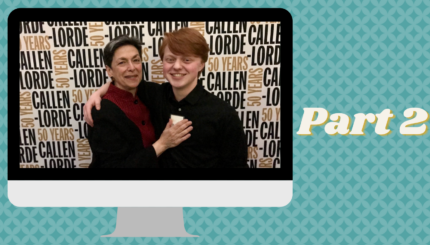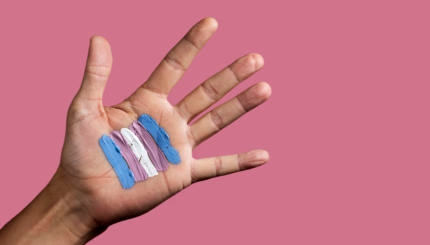When Jordyn & Becky first met, they were just starting college. Jordyn had dredlocks. Becky’s time was split between the Engineering Department and the Crew Team. Britney Spears and Justin Timberlake were still dating. And, Becky’s preferred pronouns were “she” and “her.” Now, 13 years later, all of those things have changed. But their friendship hasn’t. They sat down to talk about their friendship, life, and gender.
Jordyn: I think an important qualifier about our friendship is that it’s one of those fantastic ones where we can (and have) gone months without talking—but we can always pick it back up pretty seamlessly. And, while that’s great for the sake of knowing we’re always out there for each other, it does mean that we’ve missed big moments in each other’s lives. Like, for instance, when you started identifying as gender queer and trans.
Becky & Jordyn, Summer of 2013
Becky: That is an important thing about our relationship. And that’s true. When we first met I identified as a lesbian. It wasn’t really until I started Rabbinical School six years ago that I started to really explore ideas of gender. It was a gradual transition, starting with the way I had my haircut and what clothes I wore, eventually getting to the way I played around with and used pronouns.
Jordyn: I remember a few years ago being part of an email thread where someone said something—in reference to you—along the lines of “and he is going to…” I had to stop and check in. I wanted to be on the right page. Wondering whether or not I was going to support you, or accept you, or be there for you wasn’t the question, it was more making sure I wasn’t messing up with my language.
Becky: And language is really hard. We aren’t socialized to have control over our pronouns; having a conversation about language is a two-step process—first, discussing how we teach language and how we can chose the language we use, and second, taking that step to choose an appropriate pronoun.
Jordyn: And, I’ve messed it up—far more than once…which is really hard for me. It’s hard as an ally, it’s hard as your friend, and it’s hard because I know using the wrong pronoun is being disrespectful and unsupportive. But sometimes it’s that force of habit that makes things challenging.
Becky: We’ve definitely had conversations where you’ve started by saying “I don’t want to mess this up, but….” And, look, as long as you (or anyone) are learning and trying, that’s what I ask for. I don’t necessarily want to have a 15 minute conversation with someone about how they feel guilty each time they mess up my pronoun. Most importantly, we have to trust each other, and trust that our friendship is strong enough that one misused pronoun isn’t going to destroy it.
Jordyn: Still, I don’t want to put you in a position where you’re forced to constantly be a teacher.
Becky: But, I’m going to be a rabbi—being out there as a teacher is a role I’ve stepped into for myself. I don’t ever want to close the conversation about pronouns, or being queer. That being said, it can be exhausting.
Jordyn: Do you have advice, maybe with your rabbi hat on?
Becky: In thinking about being compassionate with someone about getting my pronouns correct, the biblical concept of “
lifnei iver
” comes to mind.
Jordyn: Meaning?
Becky: Leviticus 19:14 says: “You shall not curse a deaf person. You shall not place a stumbling block before a blind person, and you shall fear your God. I am the Lord.” As a person who identifies as trans and genderqueer and whose pronoun (intentionally) creates dissonance with my name, I try and remember that those whom I am encountering may be going through their own two-step process. First, they may be deaf towards the issues of gender and gender identity. I might be the first trans* person they meet. Rashi teaches that though the deaf person is specifically named, we can extend this verse to all those who are alive. I cannot curse someone because of their lack of knowledge. Similarly, withholding my pronoun or not correcting someone is putting a stumbling block in front of them. In the other direction, the person learning about gender or my preferred pronoun needs to acknowledge the stumbling blocks that exist in front of them. They need to know that they will stumble, and that unlike the blind person the refers to, they need not be willfully blind.
Interested in learning more? Check out Becky’s interview with Jennie Roffman, a board member at Congregation Kehillath Israel, reflecting on Joy Ladin’s Through the Door of Life: A Jewish Journey Between Genders, or some of Keshet’s Trans* resources.


